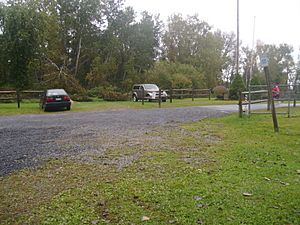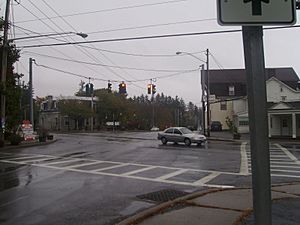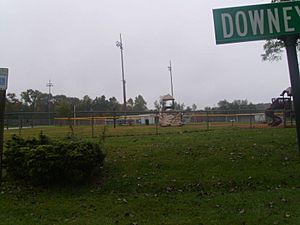Beekman Park facts for kids
Quick facts for kids Beekman Park |
|
|---|---|

The northern entrance to Beekman Park from U.S. Route 44.
|
|
| Type | Local park |
| Location | Amenia (CDP), New York |
| Area | 47.7 acres (19.3 ha) |
| Created | 1983-1985 |
| Operated by | Amenia Department of Public Works |
| Open | All year |
| Parking | 75 spaces |
Beekman Park is a fun local park in the community of Amenia (CDP), New York. Amenia is a small place in Dutchess County, New York. You can find the park right off U.S. Route 44. It's also easy to spot from New York State Route 22 and New York State Route 343.
The land for the park was bought by the Town of Amenia in 1974 for just one dollar! It was sold by Walter Beekman. The park officially opened its gates in 1983. Before it became a park, this area was home to a lake called Lake Amenia. This lake was created in the 1920s when a dam was built over a sawmill pond. People used to swim in the lake, and cottages, docks, and pavilions were built around it.
Lake Amenia lasted for about 30 years. But in 1955, a big storm called Hurricane Diane hit the area. The heavy rains caused the dam's water gates to break. This made the lake completely drain away. Today, this area is part of the New York State Wetlands. After the storm, Walter Beekman sold the land, including the former lakebed (now wetlands), to the Town of Amenia for just one dollar. Volunteers then started building the park, including baseball fields. The park opened in 1983, and the first Little League games were played there. Beekman Park is still a popular place today!
The Story of Lake Amenia
Before Beekman Park, there was Lake Amenia. It was a shallow, one-and-a-half-acre freshwater lake right in the middle of Amenia. The lake started as a small pond for a local mill that ground corn and grain. Later, the mill became a sawmill. In the 1920s, a dam was built in the pond, which created the larger Lake Amenia.
The lake had two streams that flowed into and out of it. One was near a local pizzeria, and the other was near where the tennis courts are today. This freshwater lake quickly became a popular spot for tourists. It was only two hours north of New York City. People like Walter Beekman and his company, Beekman Inc., helped develop the area. They built theaters and places for people to live around Lake Amenia. There was even a cemetery on one of the lake's islands, which is still there today as Amenia Island Cemetery.
People came to the lake for vacations. They enjoyed a pool hall, beaches, and even a new golf course. Summer visitors would take the train to Amenia Station to visit the lakeside resorts and summer camps.
However, the good times for vacationing in Amenia didn't last forever. In 1955, Hurricane Diane caused a lot of damage in New York. During the storm, the dam on Lake Amenia burst. A local story says that the dam keeper was supposed to open the floodgates for the high water. But he dropped his keys into the rushing water! This led to a huge flood.
The flood covered much of the community, including the golf course. Even though the water eventually went down, the dam was never fixed. The community struggled after the flood. Many businesses closed, and the once-busy streets became quiet. Much of the lake drained into wetlands. Some of these wetlands are now part of the New York State Wetlands. People often joked that Lake Amenia Road, named after the lake, no longer had a lake.
What Can You Do at Beekman Park Today?
After Hurricane Diane's flood, the land that used to be the lake became owned by Walter Beekman. He owned it for 19 years. Then, in 1974, he sold the land to the town of Amenia for just one dollar. The land remained undeveloped until the 1980s. That's when groups of volunteers, with money from the town, started building ball fields and making it a park.
In 1983, Beekman Park officially opened. By 1985, local baseball teams were playing games on the Don Herring Field. Some parts of the old lake still remain. You can even see a piece of the old dam in the southwest corner of the park. Amenia Island Cemetery is still there along New York State Route 343. In 2009, the town of Amenia set aside money to make improvements to Beekman Park.
The park mostly has three fields for baseball and softball. These fields are named after famous players from Amenia. One field, opened in 1985, is named for William "Doc" Bartlett. There are also some undeveloped areas in the park.
You can get to Beekman Park in two ways. One way is by car on U.S. Route 44. There's a parking lot there that can hold about 75 cars. The other way is a walking entrance at Broadway and East Broadway Avenues.



